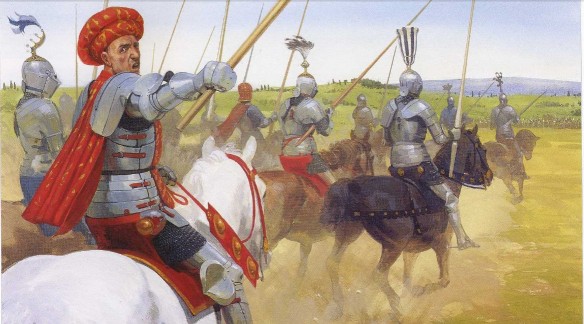English soldier and mercenary captain-general in Italy. The son of Gilbert Hawkwood of Essex, he fought under King Edward III in the Hundred Years War at the battles of Crécy (1346) and Poitiers (1356). Knighted after Poitiers, and unemployed after the Treaty of Bretigny (1360), he joined the mercenary White Company, so named for their brilliantly polished armor. While serving the Italian city-state of Pisa, Hawkwood was elected captain-general of the White Company in January 1354. He led the Pisan forces against Florence (1364), before committing his company to the service of Bernabo Visconti of Milan against Emperor Charles IV. Hawkwood was captured near Arezzo and held until ransomed in 1369. Entering the service of Pope Gregory XI in 1372, he fought in an indecisive war against Milan in 1374 and led papal forces during the War of the Eight Saints (1375). Leaving papal service, Hawkwood joined the antipapal alliances and served as captain-general of Florence from 1378 to 1381. He led Padua, an ally of Florence, to a decisive victory over Verona in the Battle of Castagnaro (11 March 1387). Hawkwood led the Florentine army in his last campaign during an inconclusive war against Milan in 1390- 1392.
In 1377 he ordered a massacre of some 5,000 innocents at Cesena. In 1387 he made the first undisputed use of gunpowder field artillery in European warfare. He returned to Florentine service as “Captain-General.” Florence’s lifetime guarantee of a large salary and awards of lands and titles was designed as much to tame and control him as to reward service. Hawkwood was for two decades the most powerful and feared military man in Italy.
Hawkwood utilized the English longbow and tactics developed in the French war during his Italian service. He was renowned for his infantry tactics, unit discipline, and utilization of lighter armor and equipment to improve the rapidity of troop movements.
Hawkwood died on 16 March 1394 in Florence. King Richard II later had his body returned and reinterred in Hawkwood’s native village.
White Company.
After the Treaty of Bretigny (1360) paused fighting in France during the Hundred Years’ War (1337-1453), mixed Free Companies of French and English drifted into Italy. The most famous was the White Company which competed with older condottieri Great Companies in the wars of the Italian city-states. It was initially commanded by John Hawkwood and was notable for bringing the new English methods of war to Italy: unlike the cavalry-dominated condottieri, men-at-arms in the White Company fought dismounted and protected by large numbers of archers. Following a dispute in 1372, Hawkwood resigned command and returned to Florence while his White Company fought for the pope.
The most powerful company of condottieri. [Contract captains.] was the “White Company,” initially commanded by John Hawkwood. Despite overseeing a massacre of 5,000 Italian innocents, he finished his days in peaceful opulence thanks to a Florentine salary and ill-gotten titles and estates from the condottieri wars.
